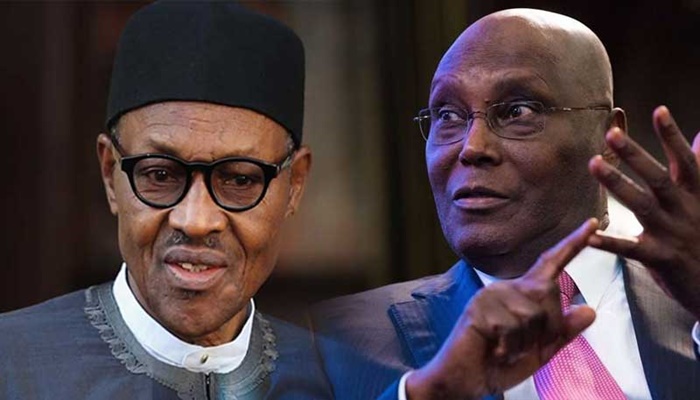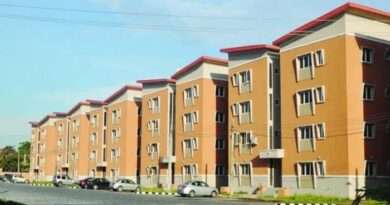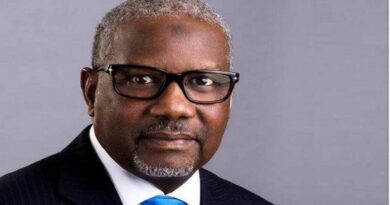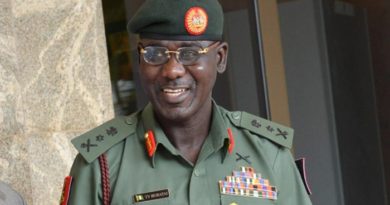Tribunal gives Atiku, PDP 10 days to prove case against Buhari
- as petitioners line up 400 witnesses
The Presidential Election Petition Tribunal sitting in Abuja, on Monday, allocated 10 days to the Peoples Democratic Party (PDP) and its candidate, Atiku Abubakar, to prove their allegation that the February 23 presidential election was rigged in favour of President Muhammadu Buhari.
The five-member panel tribunal headed by Justice Mohammed Garba, equally gave President Buhari, the Independent National Electoral Commission (INEC) and the All Progressives Congress (APC) who were cited as 1st to 3rd Respondents, respectively, six days each to defend the petition the PDP and Atiku lodged to challenge the outcome of the presidential election.
The tribunal took the decision after a brief meeting that was held by lead counsel to all the parties in the matter.
Chairman of the tribunal, Justice Garba had, before he okayed a 30-minute stand-down of the proceeding, noted that by the provision of Paragraph 16(3) of the First Schedule to the Electoral Act, the petitioners were, by law, allowed a maximum of 14 days to present their case against the election, while each of the respondents would take 10 days each to enter their defence.
When the tribunal reconvened after the stand-down, lead counsel to the petitioners, Dr. Livy Uzoukwu, SAN, announced that all the parties had, at the end of the brief meeting, agreed that the time should be abridged.
Uzoukwu further told the tribunal that his clients had lined up a total of 400 witnesses that would be called to testify and give evidence in the course of the hearing.
“We intend to call many witnesses as possible within the prescribed time”, he added.
On modalities to be adopted for hearing of the petition, he said the parties were in agreement that they would tender documents and reserve objections till the final written address.
“We, however, agreed to isolate the objections from the final address of parties. All the parties equally agreed that “ordinary witnesses” will take five minutes each to present their Evidence-in-Chief, while they would be cross-examined for 10 minutes.
It was, however, their position that “Star, Expert and Subpoenaed witnesses” would take 10 minutes each to give evidence, while 20 minutes would be used for their cross-examination.
Each of the parties would take three minutes to re-examine each of the witnesses. More so, the parties agreed that anyone with objection should indicate so at the point of tendering of exhibits, while the issue objected to would be canvassed in an address that would be different from the final written address.
They were in consensus that no contentious documents could be tendered from the Bar, while parties are to file and exchange the schedule of documents to be tendered in the course of the hearing.
With respect to final addresses, Uzoukwu, SAN, said the respondents agreed to be allowed seven days within which to file, while petitioners would take five days after service of the respondents address, to file their own.
The respondents also agreed to take three days afterwards to file their respective replies on points of law, upon that of the petitioners address.
All the parties prayed the tribunal to allow a one-hour break on each day the hearing would take place.
Meanwhile, the tribunal adjourned its proceedings until Wednesday to enable it to rule on a motion the PDP and Atiku filed on June 18, asking it to quash the proceeding it held on June 11.
Specifically, Atiku and his party are praying the tribunal to review the proceeding of that date, pertaining to a motion the APC filed to strike out certain paragraphs of the petition.
It will be recalled that the tribunal had, on June 11, struck out a motion the APC filed on May 14 for paragraphs of the petition to be struck out, after it was withdrawn by its lawyer, Prince Lateef Fagbemi, SAN.
However, shortly after the motion was struck out, Fagbemi, SAN, drew the attention of the tribunal to another similar application the party also filed on May 15.
He urged the tribunal to grant the application, contending that the petitioners failed to file any counter-affidavit to oppose it.
Reacting, counsel to the petitioners, Dr. Uzoukwu, SAN, said he had actually filed a counter-affidavit in opposition to the first motion that was withdrawn by the APC.
Uzoukwu argued that since the APC filed two similar motions on the same subject matter, he rather filed a preliminary objection for the tribunal to dismiss them for constituting an abuse of court process, instead of filing a second counter-affidavit.
In their fresh application, the petitioners asked the tribunal to set aside the entire proceeding where the 3rd Respondent (APC) was allowed to withdraw the motion they said was filed in abuse of the judicial process.
It is the position of the petitioners that the tribunal ought to have heard their preliminary objection before it struck out APC’s first motion.
In the motion, PDP and Atiku, said they would “suffer grave injustice” if their application was not granted. They applied for an order granting them leave to be heard in opposition to APC’s motion of May 15 that sought to strike out the petition as well as a list of documents and witnesses thereto.
PDP and Atiku also prayed the tribunal for an order extending the time within which they could file a counter affidavit to APC’s motion.
INEC, through its lawyer, Mr Yunus Usman, SAN, said it was opposed to the request by the petitioners.
Similarly, President Buhari’s lawyer, Chief Wole Olanipekun, SAN, filed a counter-affidavit of 10 paragraphs on June 24 and also attached two exhibits he said the tribunal should rely upon to dismiss the application.
Olanipekun argued that since the petitioners had already gone to the Supreme Court to challenge the entire proceeding of June 11, then the tribunal could no longer take any decision on the issue.
He said the exhibits were clear indication that the notice of appeal had been transmitted to the Supreme Court which he said was already seized of the matter.
Olanipekun relied on Order 8 Rule 11 of the Supreme Court Rules, 2014, to urge the tribunal to hands-off the issue relating to the June 11 proceeding.
On his part, counsel to the APC, Prince Fagbemi, SAN, through a counter-affidavit he filed on June 25, asked the tribunal to dismiss the application.
Fagbemi, however, disagreed with President Buhari’s position that the tribunal should hands-off for the Supreme Court to decide the appeal the PDP and Atiku lodged before it.
After it had listened to all the parties, the tribunal reserved its ruling till Wednesday.
PDP and Atiku had, in their joint petition, maintained that data they independently secured from INEC’s back-end server revealed that they defeated President Buhari at the poll with over 1.6million votes.
They alleged that INEC had, at various stages of the presidential election, unlawfully allocated votes to President Buhari, saying they would adduce oral and documentary evidence to show that the result of the election, as announced by the electoral body, did not represent the lawful valid votes cast. Atiku and PDP alleged that in some states, INEC deducted lawful votes that accrued to him, in its bid to ensure that Buhari was returned back to the office.
The petitioners said they would call evidence of statisticians, forensic examiners and finger-print experts at the hearing of the petition to establish that the scores credited to Buhari were not the product of actual votes validly cast at the polling units.
However, all the respondents had since filed processes wherein they urged the tribunal to dismiss the petition as lacking in merit.
President Buhari insisted that every aspect of the petition grounded on or relating to electronic data purportedly retrieved or downloaded from INEC’s server were liable to be struck out, “same being incompetent and not rooted in any existing legislation.”
He said: “That there were no incidences of corrupt practices at the election of 23rd February, 20l9, as alleged by the Petitioners; and that the declaration and return of the respondent President of the Federal Republic of Nigeria is valid and in compliance with the provisions of the Constitution, the Electoral Act, and all other Laws, Rules, Guidelines, and Regulations, regulating the election.
“That the election of the respondent as the elected President of the Federal Republic of Nigeria is valid and was conducted in substantial compliance with the provisions of the Electoral Act.
“Contrary to paragraph 17 of the petition, the respondent states that the petitioners scored a total of 11,262,978 votes, trailing far behind the respondent who scored a total of 15,191,847 votes, with a margin of 3.328.869 votes.”
Insisting that he validly earned the number of votes that were credited to him by INEC, Buhari said there was “nothing affecting the integrity of the election as there was nothing untoward on the Form ECBDM and no calculation errors can he revealed by any genuine forensic examination or statistical analysis in respect of the election.”
“The 1st respondent was duly elected by the majority of lawful votes cast at the election to the office of the President and shall, at the trial, rely on [NBC FORMS 3C8 MA) and ECBE, issued by the 1st respondent at the election.
The respondent further states that he did not only score majority of lawful votes cast at the election into the office of President of Nigeria at the election of 23rd February 2019, but, convincingly had/has the requisite constitutional spread of one-quarter of the total number of votes cast in more than two-thirds of the States of the Federation”, President Buhari argued.
- Vanguard




